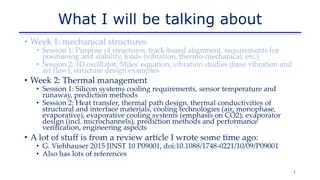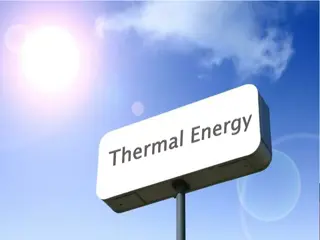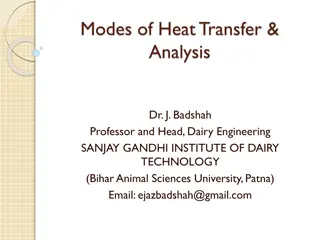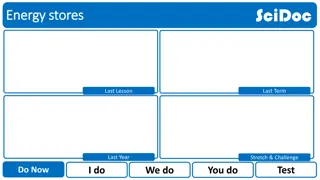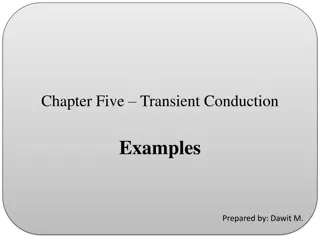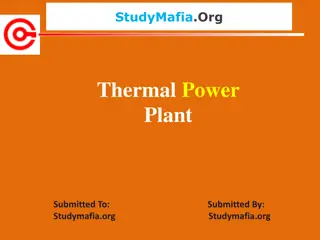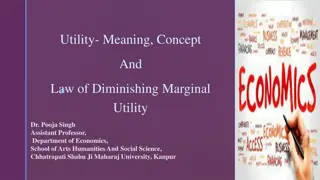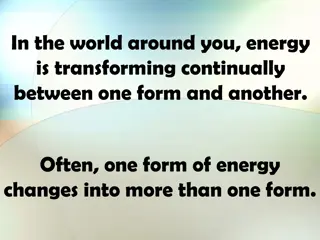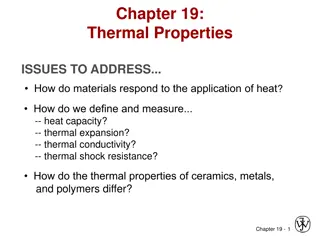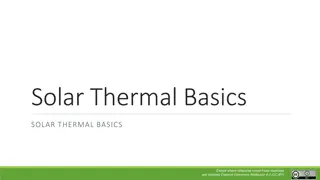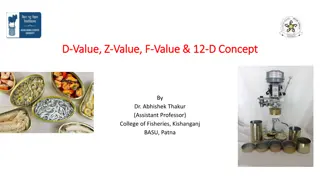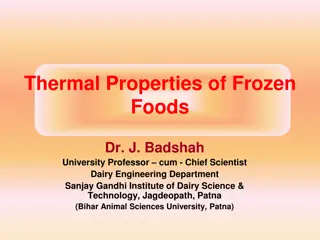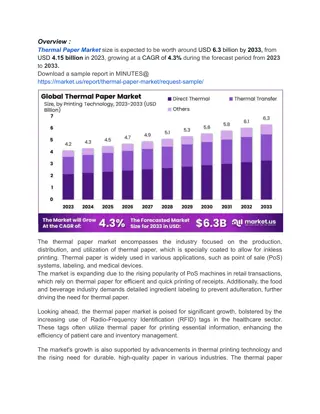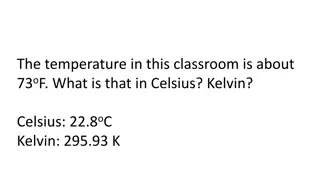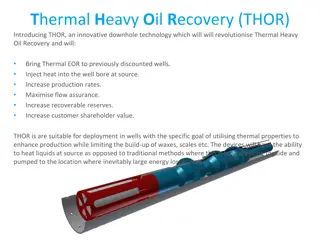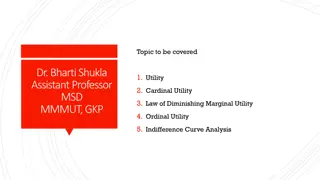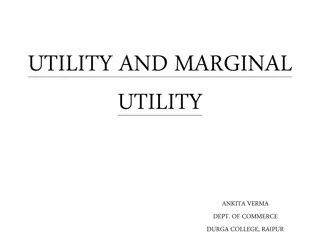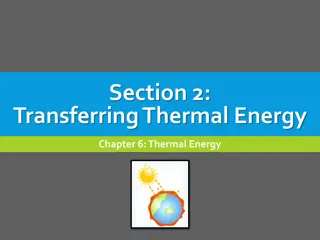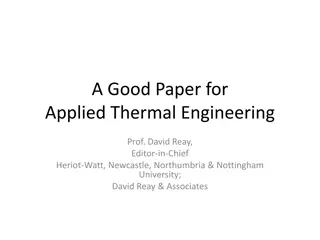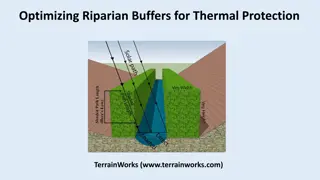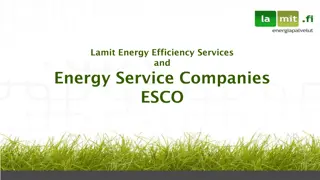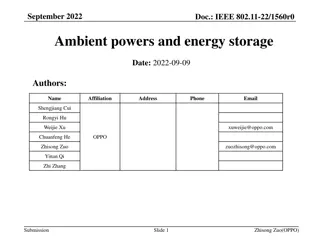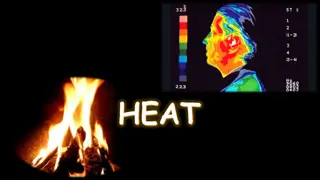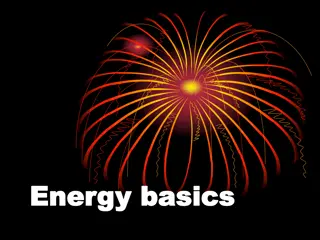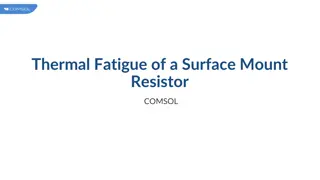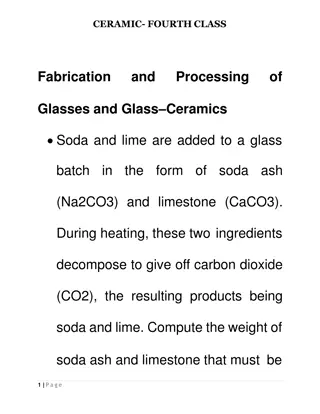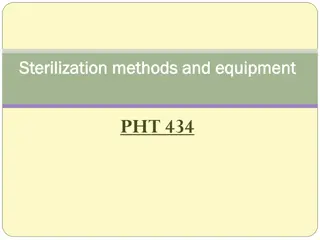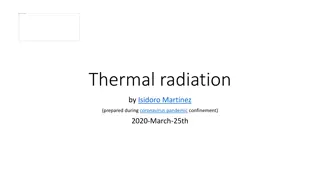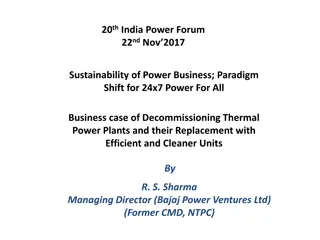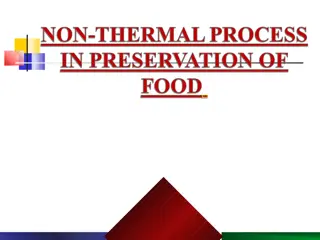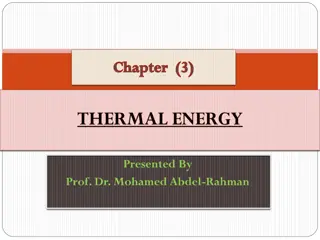Green Energy Market
Green energy also referred to as clean energy, is usually derived from natural sources that are constantly replenished. Solar energy, wind energy, hydroelectric power, biomass energy, geothermal energy, tidal energy, and wave energy are different types of renewable energy. Solar energy is the radian
6 views • 6 slides
Analysis and Modelling of Specific Energy Consumption in Thermal Power Plants
This analysis focuses on the specific energy consumption for the transportation of coal ash slurries in thermal power plants using Computational Fluid Dynamics (CFD). The study emphasizes the efficiency factor in energy consumption and its impact on the national economic engine. It also discusses th
1 views • 27 slides
Implementation of Utility Thermal Energy Network (UTEN) and Jobs Act Update
The implementation of the Utility Thermal Energy Network (UTEN) and Jobs Act involves a series of events and discussions, including the signing into law, technical conferences, pilot project proposals, and withdrawals. Various utilities have proposed pilot projects targeting different types of custo
3 views • 15 slides
Thermal Management and Mechanical Structures Overview
This content provides detailed information on mechanical structures and thermal management in engineering systems. Topics include the purpose of structures, alignment, stability requirements, thermal loads, vibration studies, heat transfer, cooling technologies, and the importance of effective therm
1 views • 37 slides
Understanding Thermal Energy: Transfer & Transformation
Explore thermal energy and its transfer mechanisms such as conduction, convection, and radiation. Learn how thermal energy moves between objects of different temperatures, and why heat is always transferred, not coldness. Enhance your knowledge on the fascinating world of thermal energy dynamics.
0 views • 14 slides
Understanding Heat Transfer: Conduction, Thermal Conductivity, and More
Explore the fundamentals of heat transfer through conduction and thermal conductivity as explained by Dr. J. Badshah. Learn about the modes of heat transfer, Fourier's law, thermal resistance, and the relationship between thermal and electrical conductivity. Discover the essential features of therma
1 views • 9 slides
Exploring Energy Stores and Transfers in Science Lessons
Dive into the fascinating world of energy stores and transfers through engaging science lessons. Recall different energy stores, common energy transfers, and create flow diagrams to illustrate energy transfers in various scenarios. Explore gravitational, elastic, magnetic, electrostatic potential en
5 views • 9 slides
Understanding Thermal Conductors and Insulators in Energy Transfer
Today's lesson focuses on energy transfer, specifically on conductors and insulators. Learn about the characteristics of thermal conductors and insulators, how they affect the flow of thermal energy, and their real-life applications. By the end of this lesson, you will be able to distinguish between
0 views • 13 slides
Transient Conduction in Thermal Energy Storage Units and Cylinders
Explore examples of transient conduction phenomena in thermal energy storage units, cylinders, and spheres. Learn how to calculate time durations, temperature changes, and energy removal rates during these heating and cooling processes. The examples cover scenarios involving aluminum slabs, oil bath
0 views • 10 slides
Energy Assistance Workshop Series Statewide Assessment
The Energy Assistance Workshop Series conducted a statewide assessment to understand energy burden and discuss utility energy assistance programs. The goal was to evaluate the effectiveness of mechanisms for energy assistance to prioritize households with higher energy burdens. The workshops aimed t
0 views • 26 slides
Understanding Thermal Power Plants: Overview and Operation
Thermal power plants play a crucial role in converting heat energy into electricity for various applications. This article covers the definition, layout, working principle, and components of thermal power plants, highlighting their advantages and top features. From converting heat into mechanical po
0 views • 20 slides
Understanding Utility: Marginal vs. Total Utility
Utility in economics is the satisfaction derived from consuming goods or services. Marginal utility measures the change in total utility as consumption increases, whereas total utility is the sum of satisfaction obtained from consuming different units of a commodity. Consumers aim to maximize total
2 views • 11 slides
Understanding Utility: Meaning, Concept, and Law of Diminishing Marginal Utility
Utility is the satisfaction or well-being a consumer derives from consuming goods or services. Total utility is the sum of satisfactions, while marginal utility is the additional satisfaction from one more unit consumed. Utility can be measured and ranked but not numerically. The Law of Diminishing
3 views • 9 slides
Understanding Energy Transformation in the Natural World
Energy transformation occurs continuously in various forms around us, following the Law of Conservation of Energy. From thermal to chemical and electromagnetic energy, different types of energy are converted and utilized in everyday processes. Examples include the conversion of thermal energy to ele
0 views • 27 slides
Understanding Thermal Properties of Materials
Materials respond differently to heat based on their thermal properties such as heat capacity, thermal expansion, conductivity, and shock resistance. The ability of materials to absorb heat, expand with temperature changes, and conduct heat varies across ceramics, metals, and polymers. Heat capacity
0 views • 19 slides
Understanding Solar Thermal Technology Basics
This content covers the basics of solar thermal technology, including insolation, passive solar design, and active solar systems for producing hot water. It explains the uses of solar thermal energy in domestic, commercial, and pool heating applications. The efficiency of solar thermal panels compar
1 views • 13 slides
Understanding Bacterial Spore Survival and Thermal Death Rates
Survival of bacterial spores during heat processing is crucial for food safety. The concept of Decimal Reduction Time (D value) and Thermal Death Time (TDT) curve help in understanding the thermal destruction of bacteria or spores. The Z value indicates the change in temperature necessary to cause a
6 views • 14 slides
Thermal Properties of Frozen Foods: Importance and Modeling Equations
Understanding the thermal properties of frozen foods is crucial for ensuring food safety and quality. Dr. J. Badshah discusses the significance of freezing, reduction of microorganism activity, and the role of thermal properties like density, specific heat, and thermal conductivity. Freezing point d
0 views • 15 slides
Healthcare Sector's Growing Adoption of RFID Tags Boosts Thermal Paper Market
Thermal Paper Market By Printing Technology (Direct Thermal, Thermal Transfer, Others), By Width (2.25\u201d (57mm) and 3.125\u201d (80mm)), By Application (Lottery & Gaming, Point of Sale (PoS), and Tags & Labels), By Region and Companies - Industry
0 views • 4 slides
Understanding Thermal Energy and Heat Transfer in Physics
Measurement conversion of temperature to Celsius and Kelvin, explanation of temperature as kinetic energy, internal energy in gases, types of heat transfer (conduction, convection, radiation), thermal conductivity, energy transfer through glass windowpane, and cost estimation of energy loss. Explore
0 views • 7 slides
How to Create Thermal Images from a Thermal Flashlight
Thermal flashlight images can be made using different approaches such as long exposure photography or using light tracking software. This guide provides detailed steps on how to capture thermal images effectively with tips on light tracking apps, long exposure techniques, and imaging locations for o
0 views • 8 slides
Revolutionary Downhole Technology for Thermal Heavy Oil Recovery (THOR)
THOR is an innovative downhole technology that aims to revolutionize Thermal Heavy Oil Recovery by bringing Thermal EOR to previously discounted wells, increasing production rates, maximizing flow assurance, and enhancing recoverable reserves. THOR's key benefits include flexible power options, safe
1 views • 6 slides
Understanding Utility Theory in Economics
Utility theory in economics explores the concept of utility, which refers to the satisfaction or want-satisfying capacity a commodity provides to consumers. It is subjective, relative, and can vary among individuals. Cardinal utility analysis quantifies utility in numbers, while total utility and ma
3 views • 13 slides
Understanding Utility and Marginal Utility in Economics
Utility refers to the satisfaction a consumer receives from consuming commodities. It is a subjective concept that can be measured through cardinal or ordinal approaches. Cardinal approach involves measuring utility numerically, while ordinal approach orders levels of satisfaction based on utility.
0 views • 16 slides
Understanding Thermal Energy Transfer Methods
Explore the three primary ways thermal energy is transferred - conduction, convection, and radiation. Dive into the characteristics of good conductors, such as metals, and how they facilitate heat transfer. Learn about the role of insulators in controlling thermal energy flow and discover the best h
1 views • 24 slides
Insights into the Editorial Process of Applied Thermal Engineering Journal
Applied Thermal Engineering journal, under the leadership of Editor-in-Chief Prof. David Reay, has a rich history dating back to 1981. The journal's evolution, from its origins as Heat Recovery Systems to its current name and scope, reflects its commitment to advancing thermal engineering knowledge.
0 views • 29 slides
Understanding Different Forms of Energy and Work in Physics
Energy in physics is the capacity to do work, and there are various forms of energy such as radiant energy, kinetic energy, gravitational potential energy, elastic potential energy, chemical potential energy, nuclear potential energy, electrical potential energy, thermal energy, and sound energy. Ea
0 views • 47 slides
Optimizing Riparian Buffers for Thermal Protection in Teanaway River Watershed
Explore the study comparing optimized riparian buffer designs with fixed-width buffers in non-fish bearing streams of the Teanaway River watershed, focusing on maximizing thermal energy reductions with considerations for channel orientation and forest density. By utilizing NetMaps and thermal energy
0 views • 24 slides
Understanding Energy Service Companies (ESCOs) and Their Role in Energy Efficiency
Energy Service Companies (ESCOs) like Lamit offer a range of energy services, from implementing energy-efficiency projects to renewable energy solutions. These companies work as long-term energy management partners, focusing on understanding customer needs, providing energy-saving solutions, and gua
2 views • 18 slides
Ambient Power Harvesting Technologies Overview
This document discusses various ambient power harvesting technologies such as RF energy, solar power, light, and thermal energy. RF-based energy harvesting utilizes radio waves for power transmission with potential applications in logistics, smart homes, and environmental monitoring. Solar power off
0 views • 12 slides
Understanding Thermal Energy and Heat
Explore the concepts of thermal energy and heat through informative activities and discussions. Learn about the differences between thermal energy and heat, internal energy, bond energy, and more. Enhance your understanding of how energy is transferred and the importance of these concepts in everyda
0 views • 46 slides
Understanding Energy Basics: Temperature, Heat, and Transfer
Explore the fundamental concepts of energy, including temperature, heat, and energy transfer. Learn how temperature differs from heat, how they are measured, and the relationship between thermal energy and water volume. Discover the role of chemical energy and sound energy, and how energy is transfo
0 views • 12 slides
Thermal Shock Testing of Gel-Bonded Magnesia Refractories
Study conducted by Paul Bosomworth at Leeds University in 1986 aimed to reduce mechanical damage after thermal shock in magnesia refractories used in sliding gates. The research focused on using gel-binders and achieving optimum grain packing to enhance thermal stress damage resistance. The study al
0 views • 7 slides
Thermal Fatigue of a Surface Mount Resistor: A COMSOL Analysis
A COMSOL analysis is conducted on the thermal fatigue of a surface mount resistor subjected to thermal cycling. The study focuses on the solder joint, structural integrity, and life prediction using fatigue models. Various aspects of the resistor assembly, including material composition, dimensions,
0 views • 13 slides
Ceramic Fourth Class: Glass and Ceramic Fabrication and Processing Overview
The Ceramic Fourth Class covers topics such as glass and glass ceramic fabrication, composition calculations, thermal properties of different glasses, introduction of thermal stresses in glass pieces, resistance to thermal shock, thermal tempering processes, clay mineral characteristics, whiteware c
0 views • 10 slides
Understanding Sterilization Methods and Equipment for Pharmaceutical Products
Sterilization is crucial in the production of sterile pharmaceuticals, involving the removal or destruction of microorganisms to ensure product safety. Methods include physical (moist heat, dry heat, irradiation), chemical (gaseous, liquid sterilants), and non-thermal techniques like ethylene oxide
0 views • 35 slides
Understanding Thermal Radiation and its Effects
Thermal radiation, studied by Isidoro Martínez during the COVID-19 pandemic, explores the transfer of heat through conduction, convection, and radiation. It delves into the concept of thermal effects of radiation, blackbody radiation, and related laws like Planck's law, Stefan-Boltzmann's law, and
0 views • 23 slides
Discussion on Sustainable Energy Solutions and Efficiency Improvements in Thermal Power Plants
The 20th India Power Forum held on 22nd November 2017 highlighted the importance of sustainability in the power business, focusing on the paradigm shift towards 24x7 power for all. Topics included decommissioning thermal power plants for more efficient and cleaner units, with insights from industry
0 views • 16 slides
Innovations in Non-Thermal Food Processing Techniques
Non-thermal processing methods have emerged as a solution to the limitations of thermal food processing, offering benefits such as better retention of volatile compounds, nutrients, and flavors. This article explores various non-thermal techniques like Ohmic Heating, Microwave Heating, Pulsed Electr
0 views • 16 slides
Understanding Thermal Energy Transfer and Heat Exchange
Exploring thermal energy in Chapter 3, we delve into concepts like heat, internal energy, specific heat, calorimetry, latent heat, phase change, energy transfer, and global warming. Discover how energy moves between objects of different temperatures and learn about the definitions and units of heat
0 views • 11 slides



